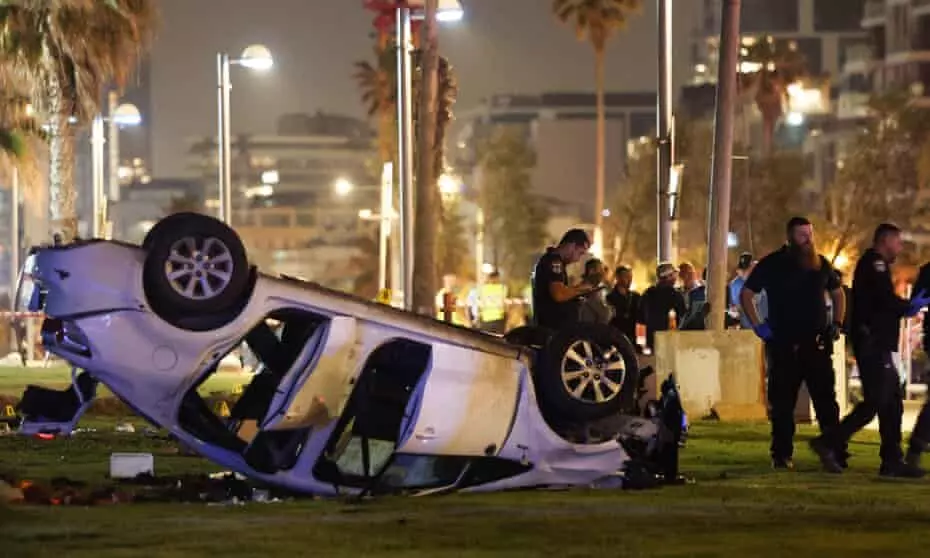
One killed and five injured in violence in Tel Aviv
text_fieldsTel Aviv: An attack in the Israeli city of Tel Aviv near the beach resulted in the death of an Italian man and the injuries of five other British and Italian tourists. This new incident of violence came after several days of escalating tensions stoked worries of a wider conflagration in the region.
The 30-year-old Italian passed away from a gunshot wound on Friday night, the Jewish holy day, according to Israel's rescue service. At the same moment, Israeli police reported that the driver of a car that struck people near the beach had been shot and killed.
If this has been a single occurrence or two distinct ones, it was not immediately evident, the Guardian reported.
The attacker was an Arab Israeli citizen from the northern village of Kafr Qasem, according to Israeli media.
The leader of Italy, Giorgia Meloni, identified the man as Alessandro Parini from Rome and voiced "solidarity with Israel for the vile attack." Five more British and Italian visitors, including a 74-year-old male and a 17-year-old girl, were being treated for minor to moderate wounds, according to Israel's rescue service.
Following the event, Israeli Prime Minister Benjamin Netanyahu authorised the deployment of police and army reserves, according to a statement from his office.
Social media users posted videos of the incident, which showed the automobile veering off the road and into a path before tipping over onto the beach.
The attack takes place against the backdrop of concerns about the Israeli-Palestinian conflict escalating and involving the potent Hezbollah militant organisation after Israel bombed sites in the Gaza Strip and Lebanon early on Friday in response to rocket fire attributed to Palestinian militants from the two territories.
Israel and Lebanon are still technically at war, and Thursday's attack of around 34 rockets fired at northern Israel was the worst outburst between the two nations since a brief conflict with a militant group backed by Iran in 2006.
By daylight, it appeared like things had calmed down along the borders, and the fact that no one had been hurt during the border skirmishes further indicated that no side wanted to take a chance at escalating the conflict.
Despite the tensions and an inflow of tourists travelling to observe the extremely uncommon overlapping holidays of Easter, Passover, and Ramadan, more than 130,000 worshippers attended Friday prayers at Jerusalem's holiest shrine, which went off without much incident.
However, a shooting incident in the West Bank that left two British-Israeli sisters dead and their mother gravely injured hours later, the shooting down of a drone that had infiltrated Israeli territory from Lebanon, and the attack in Tel Aviv signalled that a larger escalation is still a significant threat.
Despite the tensions and an inflow of tourists travelling to observe the extremely uncommon overlapping holidays of Easter, Passover, and Ramadan, more than 130,000 worshippers attended Friday prayers at Jerusalem's holiest shrine, which went off without much incident.
However, a shooting incident in the West Bank that left two British-Israeli sisters dead and their mother gravely injured hours later, the shooting down of a drone that had infiltrated Israeli territory from Lebanon, and the attack in Tel Aviv signalled that a larger escalation is still a significant threat.
A US state department spokesperson on Friday “strongly condemned” the attacks, and said the “targeting of innocent civilians of any nationality is unconscionable.”
A UK Foreign Office spokesperson called for “all parties across the region to de-escalate tensions.”
After Israeli forces twice attacked the al-Aqsa mosque compound in occupied East Jerusalem, which is revered by both Muslims and Jews, who refer to it as the Temple Mount, a new round of rioting broke out on Wednesday. In response to a video showing police using batons and rifle butts to beat Palestinian worshippers, outrage swept throughout the Muslim world on Thursday, which prompted rocket fire from the Hamas-controlled Gaza Strip.
Over the past week, Israel has launched many attacks in Syrian territory against Hezbollah, the Shia organisation that aids Israel's arch-enemy Iran in projecting its dominance throughout the region. Israel has targeted what it thinks to be drone manufacturing facilities. There have been at least two deaths among the organisation's members.
Although the militant group has threatened to retaliate, it is cautious of escalation, much like Hamas. It's possible that the bloodshed at al-Aqsa served as justification for retribution. Even though Israel claimed that Hamas was responsible for the strike from Lebanon, many people feel that Hezbollah must have given the order.
After the deadliest start to a year in Israel and the occupied West Bank since the second intifada, or Palestinian uprising, in the 2000s, this week's bloodshed follows. According to a tally by human rights organizations, some 90 Palestinians, have been killed by Israeli fire so far this year. Sixteen Israelis, all but one of them civilians, three Ukrainians, and the Italian national shot on Friday had been slain in "lone wolf" attacks by the Palestinians.
Since the most right-wing government in the nation's history took power at the end of last year, Israel has likewise been engulfed in political unrest. Military reservists have participated in sizable demonstrations against the coalition's proposed judicial reform, which raises questions about their operational readiness.
For publicly opposing the judicial reform two weeks ago, Netanyahu publicly sacked his defence minister, although it appears that he is still in his position.























